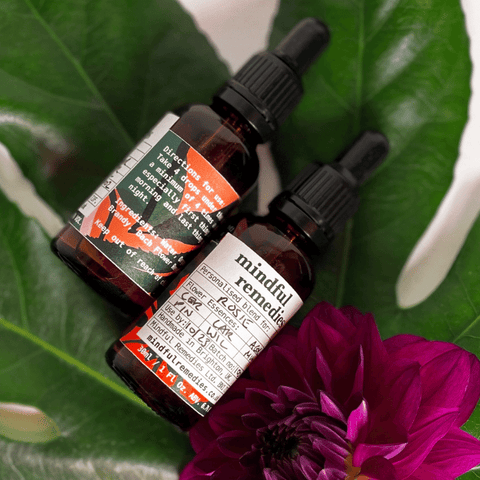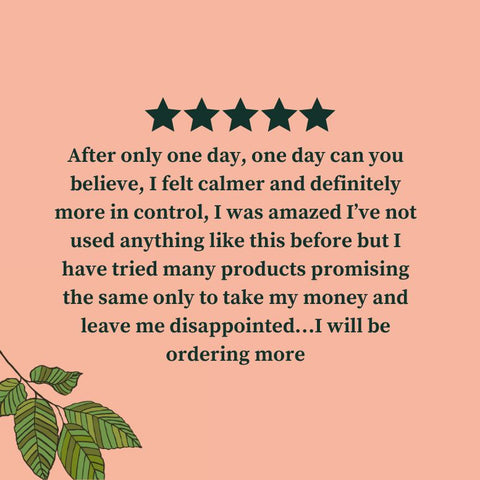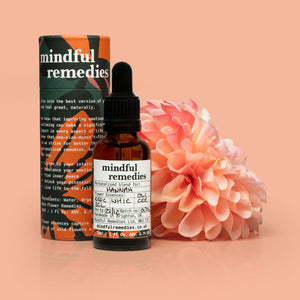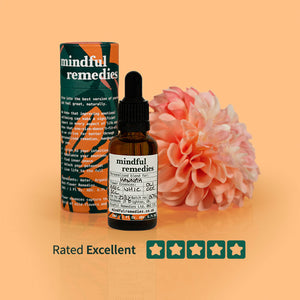your basket
- choosing a selection results in a full page refresh

Bach flower remedies (also known as flower essences) have been gaining popularity as an alternative therapy for various emotional and mental health concerns. However, there is still a debate over whether or not these remedies really work. While some people may attribute their positive experiences with flower remedies to a placebo effect, others argue that the benefits are real and can even be seen in babies, children, and animals who have no conscious understanding of the potential effects.
So, do Bach flower remedies really work? Let's take a closer look at what flower remedies are, how they are made, and the evidence supporting their efficacy.

Bach flower remedies are a type of vibrational energy medicine that works by harnessing the energy of specific flowers to promote emotional and mental healing. They were created by Dr Bach in the 1930s and have been used widely since, most commonly known as Rescue Remedy which is a five flower formula he created for emergencies. They are made by infusing flowers in water under specific conditions of sunlight and temperature, resulting in a highly diluted solution that contains the energetic essence of the flower. The energetic signature of the flower is thought to be transferred to the water, creating a potent remedy that can address a range of emotional and mental health concerns. There are 38 different flower remedies, with each one helping to rebalance a specific emotion, for example anxiety, depression, stress, insomnia and much more. The remedies are typically taken orally but can also be applied topically to the skin.
While the concept of vibrational medicine may seem new age or even pseudoscientific, there is some scientific evidence to suggest that flower remedies can have a beneficial effect on emotional and mental health. There are also many anecdotal stories and reviews which shed a positive light.
Here are a few studies that have been conducted on the effectiveness of Bach flower remedies:
The Science Direct paper ‘Do Bach flower remedies have a role to play in pain control?: A critical analysis investigating therapeutic value beyond the placebo effect, and the potential of Bach flower remedies as a psychological method of pain relief’, Howard 2007, explores the potential of Bach flower remedies as a means of pain relief. The study involved a retrospective case-study analysis to establish how clients suffering from painful conditions responded to the therapy. The study found that the use of Bach flower remedies resulted in positive emotional changes in the majority of clients, including relief of negative emotions and promotion of positive thought. Of 384 subjects, 41 suffered pain. Of these, 46% felt treatment had relieved their pain; in 49% the physical outcome was unknown. About 88% of all subjects reported an improvement in their emotional outlook. Although the study could not draw a definitive conclusion as to the therapeutic value of Bach flower remedies above that of a placebo, the results were encouraging. The study suggests that Bach flower remedies have potential as a therapeutic agent in the relief of pain and warrants further investigation through robust, purpose-designed studies to replicate and progress the results shown.
Dr. Jeffrey Cram, Ph.D., who worked as a research and clinical psychologist with the Sierra Health Institute in Nevada City, California, conducted two double-blind placebo studies to examine the effects of flower essences on stress. The first study involved the use of Five-Flower Formula (also known as Rescue Remedy) by subjects during a mental arithmetic exercise. The study found that the group using the flower remedy had significantly reduced reactivity, as measured by muscular activity at spinal locations corresponding to the heart and throat chakras. The second study involved the use of Five-Flower Formula and Yarrow Special Formula (now known as Yarrow Environmental Solution) with subjects exposed to strong, unshielded fluorescent lights. Measurements were taken of both EMG (muscular activity) and EEG (brain wave activity). Results showed that those taking either flower essence formula showed far less reactivity to the lights, as measured by beta wave brain activity at nine sites clustered around the frontal lobes and by muscle activity in the heart chakra area.

The article ‘Five Clinical Studies Demonstrate the Effectiveness of Flower Essence Therapy in the `treatment of Depression’ published by the Flower Essence Society discusses a series of studies conducted to assess the efficacy of flower essences in treating mild to moderate depression. Five independent clinical outcome studies were analysed using the Beck Depression Inventory (BDI) and the Hamilton Depression Scale (HAM-D), all showing a significant decrease in depression with the use of flower essence therapy. Although there are challenges to both internal and external validity of the studies, the convergence of findings strongly supports the concept that flower essences may be used adjunctively to facilitate the resolution of mild to moderate depression. It should be noted that in all these studies the participant received “individualised” treatment versus standardised treatment. The “individualised” prescribing method of the flower essence practitioner may confuse the traditional operational definition of the independent variable. In the studies referenced in the paper, over 100 different flower essences were utilised, with an average of eight different essences being administered to a given subject. What is being tested in these studies is not a specific flower essence (or a specific combination of essences), but rather a method of individualised flower essence treatment. As an aside, this supports the personalised approach supported by Mindful Remedies (author of this blog.)
It's worth noting that many of the studies conducted on flower remedies are small and of limited quality, so more research is needed to determine their true effectiveness. However, these studies suggest that flower remedies may be a promising therapy for a range of emotional and mental health concerns.

The idea of the placebo effect suggests that a person's belief in a treatment can sometimes lead to improvements in their symptoms, even if the treatment itself is ineffective. This can make it difficult to determine whether a particular therapy is truly effective or if the improvements are simply due to the placebo effect.
However, when it comes to flower remedies, there are some cases where the benefits are seen in individuals who have no conscious understanding of the potential effects. For example, babies, young children, and animals have all been known to respond positively to flower remedies, despite not having a conscious belief in their efficacy.
In the case of babies and young children, it is possible that the benefits of flower remedies may be related to their calming and soothing effects. Babies and young children may pick up on the subtle energetic vibrations of flower remedies, which can help to soothe their emotions and promote a sense of calm. In some cases, parents have reported that using flower remedies has helped their children sleep better, reduced their anxiety, and improved their overall mood.
Similarly, animals have also been known to respond positively to flower remedies. This may be because animals are highly attuned to energetic vibrations and may be able to pick up on the subtle effects of flower remedies. For example, some pet owners have reported that using flower remedies has helped to calm their anxious pets, reduce their aggression, and promote overall calm and better temperament.
While it is still unclear exactly how flower remedies work, the fact that they can have a positive effect on babies, young children, and animals who have no conscious understanding of their potential effects suggests that there may be more to these remedies than just the placebo effect.

The evidence supporting the efficacy of flower remedies is not yet strong enough to be considered conclusive. Much of the research conducted on flower essences has scientific limitations and more high-quality studies are needed to determine their true effectiveness.
Despite the lack of conclusive scientific evidence, many people have reported positive experiences with flower remedies. These anecdotal reports suggest that the remedies may be helpful for a range of emotional and mental health concerns, including stress, anxiety, depression, grief, and trauma.
If you’re interested in reading some first-hand testimonials from people who have used Bach flower remedies, you can read some Mindful Remedies reviews via the link below. Note the products reviewed here are all personalised combinations of flower remedies or consultations with a Bach flower practitioner.

Since 2021, Lucy Edwards, a qualified Bach Flower Practitioner and the driving force behind Mindful Remedies, has connected with clients across the world. Crafting thousands of personalised remedies, Lucy has supported individuals' emotional wellbeing, shipping remedies to far-flung places like the USA, Thailand, and Australia.
Lucy is readily available for conversations, offering personalised advice to guide you on the path to holistic wellness. It's important to note that she's not only qualified but also registered with the Bach Centre, ensuring that every consultation and remedy adheres to Dr Bach’s original guidelines for expert care and efficacy.
Exclusive pricing 20% off your first subscription order and 5% off all future orders
VIP treatment Receive personalised advice from Lucy, free gifts & 15% off gift vouchers
Easy to manage Edit remedy, change schedule, pause or cancel at any time
Exclusive online workshops Access to workshops focusing on emotional wellbeing, guided by Lucy
Early access to new products Be the first to try out new remedies or wellness products, before anyone else



